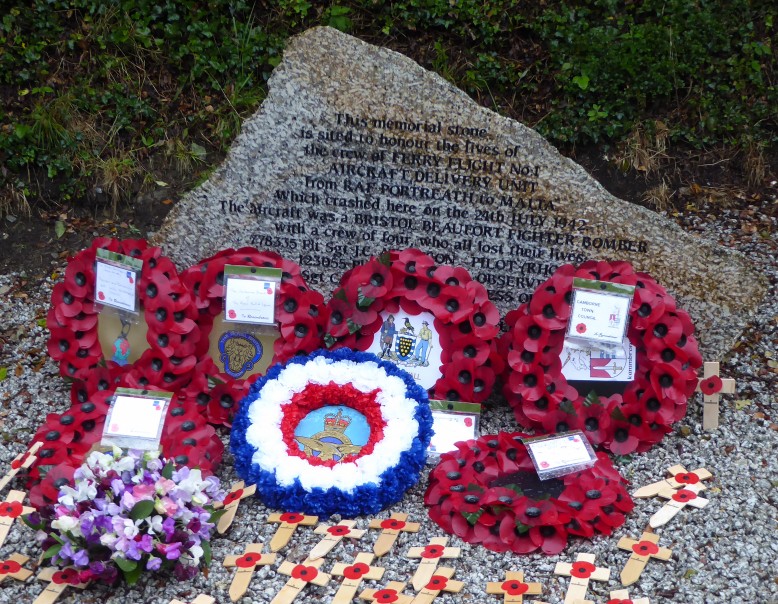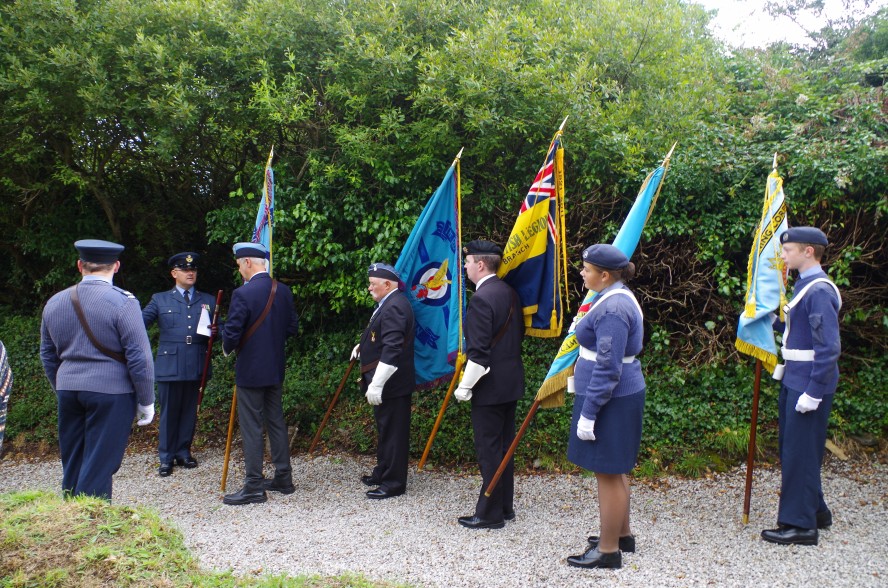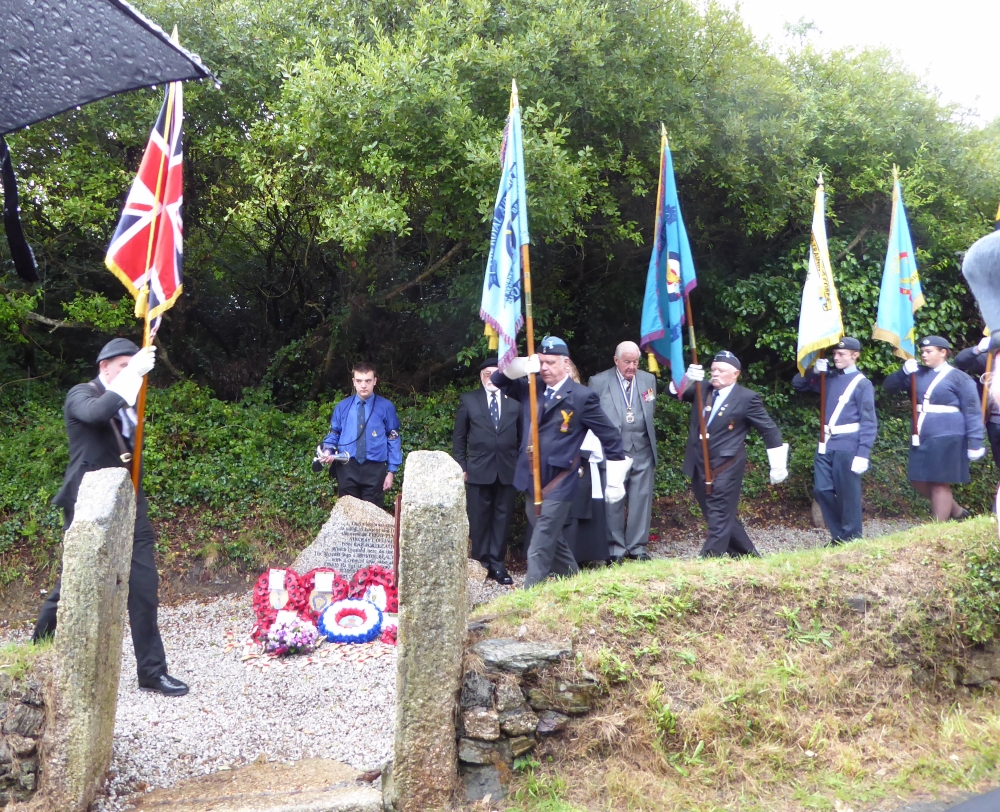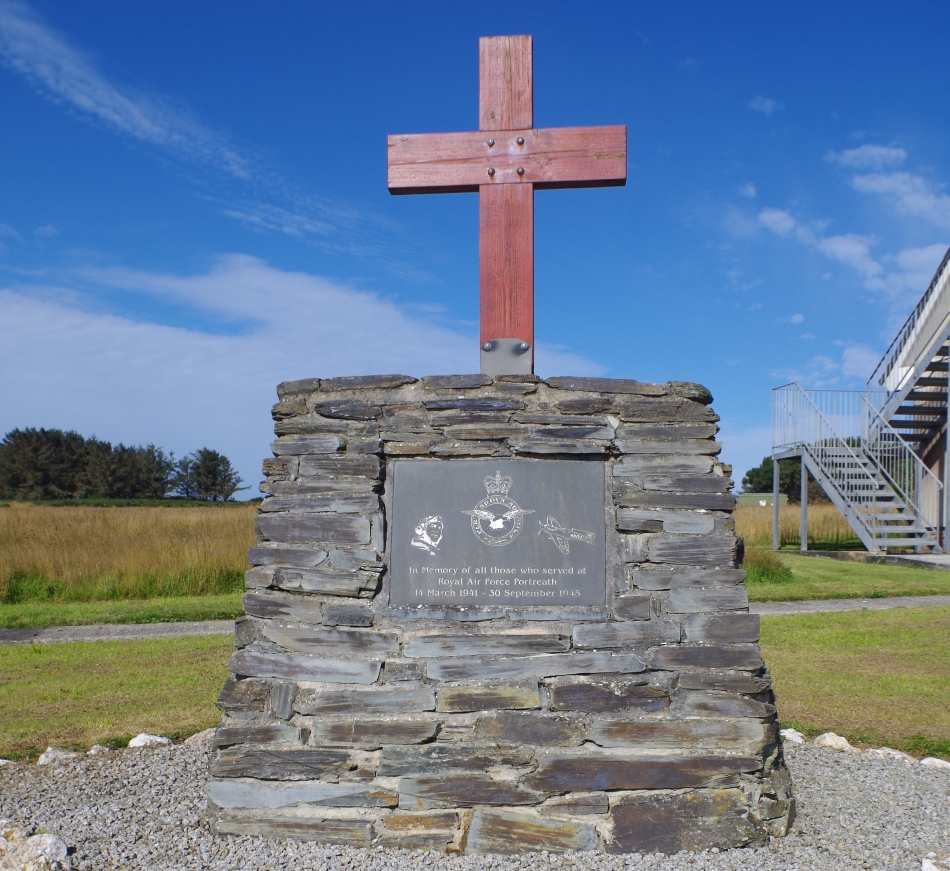
The 75th Anniversary Remembrance Service
22nd July, 2017
The memorial

Standard bearers

Standard bearers preparing to march out

Event photographs courtesy of Helen Atkinson.
This piece was written for us by Reg Austin.
Saturday 22nd July 2017.
Service of Remembrance.
For
Flight Sergeant John Campbell Atkinson, (Pilot)
Pilot Officer Frank Samuel Day, (Observer)
Sergeant Charles Richard Taylor, (Wireless Operator/Air Gunner)
Sergeant John Orford Twelvetrees, (Wireless Operator/Air Gunner)
On 24th July, 1942 they were the crew of a heavily fueled Bristol Beaufort torpedo bomber of 1 OADU which took off from RAF Portreath for Malta, where it would be based to attack shipping supplying Rommel's Afrika Korps. Within minutes an engine failed, still low, the plane turned to avoid the town of Camborne and crashed into an abandoned chapel in Roscroggan. The entire crew were killed.
Seventy-five years later we were part of a remarkable gathering at the site of the crash to remember them and their sacrifice. It struck me that most of us present; local villagers and Councillors; British Legion officials; the RAF Chaplain; veterans and serving Airmen and Women; and even us, the Crew's relatives, had never personally known the people we were remembering and honouring. The exception, in the case of John Campbell Atkinson's family, was Olive, his then six year old niece. Yet the gathering, one felt, was an intensely personal occasion for everybody there. The warmth and feeling of familiarity is probably inevitable when sharing the reality of lives lost in a common but seldom articulated Cause.
Our family connection with the gathering was with John Campbell Atkinson. We were; his nieces - Olive Austin and Carol Trickey (both nee Young, daughters of Rose Young, John's sister); his Great Nieces - Josephine Richards, Beatrice Witcomb and Laura Murillo, (all nee Austin), daughters of Olive and I. We arrived in pleasant, light-hearted morning sunshine. It was fitting weather for our family reunion with an Uncle and Great Uncle, a young electrician from Wankie (now Hwange), Southern Rhodesia, as it then was, a 1941 RAF Volunteer Reservist.
As the parade and service progressed, the weather, matching our sombre realisation of the loss of John, his fellows and so many others in that cause, turned to a steady downpour. Reflecting the historic airmen's resolve, the ceremony proceeded through the ever gut-wrenching moments of the Last Post, Reveille, the Kohima Epitaph and the rigid salutes of the Wreath laying.
The proceedings provided a time to focus and reflect on the incidents, accidents and coincidences of the life we were remembering and imagining. Having recently come from his home country, I was struck by the ironies and thoughts raised by suddenly apparently meaningful, floating words, which stirred my little knowledge of the man, his family and his country. No other occasion would have been so stimulating and stirring.Among these words were; Bristol, Mining, Camborne, Rain and Drought.
Bristol.
John's father, Bert Atkinson, was born in Bristol. He had run off to Canada and served as an Empire Serviceman, like John, with a Canadian Unit in the WWI East African campaign in 1915/16. He went on to South Africa, married Helen Campbell in Pretoria, had a daughter, Rose, and started mining in Messina (Musina) where John was born. In 1918 he started to farm in Matetsi (near to the Victoria Falls) in Southern Rhodesia. John's early life was in the Rhodesian Bush. Home was a Pole-and-Dagga farmhouse, they travelled by ox-wagon and were surrounded by a rich, wild, animal, African life. Matetsi was later incorporated into the Wankie Game Reserve, renowned now, as the scene of the Lion Cecil's unfortunate encounter with an American Dentist. The coincidence of Bristol in the life and death of Bert and John Atkinson seemed strange as one reflected on its place in their history, in the gentle rain.
Rain, Drought and Mining
Rain and Drought are a matter of Life and Death in Zimbabwe today just as they were in Southern Rhodesia in the late nineteen-twenties. In the Atkinson family's case it was directly linked to the disastrous death of Bert Atkinson. Drought hit the farm and Bert, with the family, was forced to move back into Mining,then the mainstay of the new, forty year old Colony. In April 1929, Bert was killed in a mining accident.
The family eventually found a stable living in Wankie, the Coal mining town near Matetsi. John went to Milton boarding school in Bulawayo and then on to become an apprentice electrician at the mine. Bert's widow, Helen Atkinson, had set up and managed the Wankie Guesthouse/Mine Single Quarters, with John and her daughters Rose and Helen. Rose married there, Bob Young, a recent immigrant from Yorkshire, and in 1935 Olive was born. In the same year their Mother died, leaving Rose and John to care for the family.
Camborne
As a "Mineboy" John would have known of the "Temple of Mining", that famous but distant place - The Camborne School of Mines! John must have been pleasantly surprised by his deployment to a base next to Camborne.
It was intensely moving, as we stood together in, as the Chaplain noted; "the baptismal rain", to know that John, when he piloted the failing Bristol Beaufort, was not only to attempting to return to base, but avoid Camborne and the civilian fatalities which crashing there would have caused. This emotion was heightened by the knowledge that local people, including the then 17 year old, Ella Whear, who had witnessed the crash and joined us at the ceremony, recognised the courage and skill of the crew and worked over the years to have the site and the event commemorated.
Reg. Austin.
July 2017.
These words are from Beatrice Austin, John Campbell Atkinson's great-niece
Whilst my sisters and I didn't know our Great Uncle John, only his sisters Rose and Helen through my mum's connection, we all felt that the ceremony was incredibly important to attend and felt very privileged to be able to remember not just John, but also his crew, who perished with him. Along with all his peers, from so many different countries whose stories, some told, some untold that are incredibly important to remember. It's so crucial to continue to be able to look back and reflect across generations on the sacrifice that was made and hopefully move closer to a future that sees different ways of resolving conflict, one where lives are protected instead of sacrificed.
Many Thanks - Bea, Josie & Laura.
The war memorial at RAF Portreath
